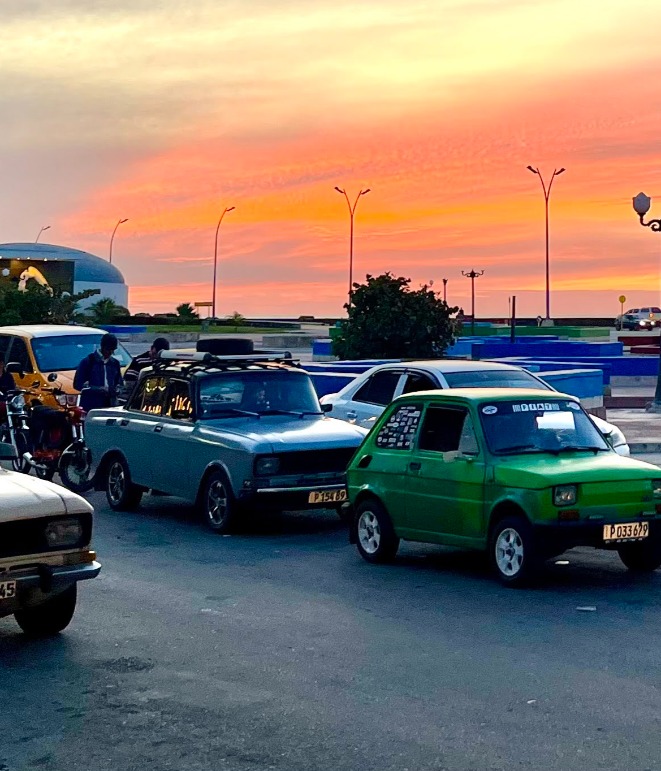
Interview: Ike Silver in Fast Company
Silver explains why some CEOs are now choosing to take political stances.
ExCEL Program Offers Once-in-a-lifetime Learning in Cuba
ExCEL Program Offers Once-in-a-lifetime Learning in Cuba
The ExCEL program provided Jose Roca-Leon (MBAPM Class of 2025) and classmates an immersive, hands-on learning experience in Cuba, focusing on the country's culture and complicated economic realities.

The ExCEL program visited Cuba over winter break.
[Photo courtesy of Roca-Leon]
Jose Roca-Leon traveled to Cuba along with other USC Marshall students, as a member of USC Marshall’s EXCEL PROGRAM (International Experiential Corporate Learning).
Roca-Leon, an MBA.PM student and an Ernst and Young consultant, journeyed to the island country with 36 fellow Marshall students, accompanied by CARL VOIGT, academic director for international business education and research, and SEAN O’CONNELL, director of undergraduate international programs.
ExCEL is an immersive 10-day program, in which participants meet with national leaders and industry insiders while developing an appreciation and understanding for the economic realities and cultural differences of the country. In the past, ExCEL has journeyed to Barcelona, Spain, Milan and Florence, Italy, and Dubai and Abu Dhabi, United Arab Emirates.
Voigt shared that this Cuba trip represented a special opportunity for students to experience the country’s unique culture and economy.
“The extreme contrasts in political and economic models in Cuba make it a great learning laboratory for students to ‘test’ the assumptions about how economies and political systems should and do work,” Voigt said. “It brings about natural discussions that never happen, or rarely happen, among our business students about the good and the bad of our own economic and political model.”
Roca-Leon, who is well-traveled, shared that the ExCEL trip extended far beyond tourism. The group’s hands-on learning opportunities at companies provided an invaluable experience to take part in Cuba’s businesses and daily life.
“What I really wanted to experience — as opposed to just taking a tourism trip — was to understand how things are done and why things are done differently, and getting access to people that have a wildly different viewpoint on life,” Roca-Leon said.
For Roca-Leon, the ten-day journey was a once-in-a-lifetime immersive opportunity he wasn’t going to miss. It allowed him and his classmates to experience Cuba like few ever have.
“I probably won’t have a chance to do this ever again,” Roca-Leon said. “This is an opportunity that’s not afforded to everybody, not even everybody in every MBA program.”
Upon arrival, students explored the island’s economic infrastructure. They toured multiple Cuban companies, including a clothing store for dignitaries, a national tobacco distributor, and a sugar mill that doubles as a power plant by generating heat that is then recaptured to generate electricity.
While visiting the mill, a reporter from the nationally owned television network Cubavision INTERVIEWED Roca-Leon and a classmate about their impression of the plant. Roca-Leon was impressed by the plant’s upkeep, which still uses machinery that’s nearly a century old.
I’ve had the opportunity to do a lot of traveling in my life, and I don’t think any trip has been this impactful to me personally, quite like this Cuba trip has.
— Jose Roca-Leon
MBA ’25
“What surprises me most is seeing the wisdom of the Cuban people and the Cuban industry to take this equipment that is hundreds of years old,” Roca-Leon said.
Voigt views ExCEL as a challenge for students to think outside the box of American economics. Without the familiarity of home, they must adapt to new opportunities and surroundings.
“Cuba forces business people to contemplate how they would do business in such a different marketplace … to think explicitly about things they normally take for granted,” said Voigt.
The information Roca-Leon and his classmates received on their trip couldn’t be learned in a book. According to Voigt, the true value of ExCEL comes from the firsthand conversations with local citizens, officials, and managers, who were quick to share their honest opinions.
“Cuba does not restrict what their citizens say,” Voigt said. “Many are very frank about the challenges Cuba has. But they all express fierce patriotism. They just want to be respected as a country.”
Aside from the hands-on experience, the program also provided Roca-Leon an unexpected chance to network and bond with fellow Trojans. While a member of USC Marshall’s PART-TIME MBA (MBA.PM) PROGRAM himself, many of his ExCEL classmates came from other graduate and undergraduate programs at Marshall.
“You get questions from a lot of different backgrounds about distribution, about technology, about what it’s like to be an intern. You have a lot of variety in the kinds of questions being asked,” Roca-Leon said of the range of students from across programs who participated in the ExCEL trip.
Looking back, Roca-Leon will always remember his 2024 winter break, spent with his fellow Trojans. “I’ve had the opportunity to do a lot of traveling in my life, and I don’t think any trip has been this impactful to me personally, quite like this Cuba trip has,” Roca-Leon said.
RELATED
Interview: Ike Silver in Fast Company
Silver explains why some CEOs are now choosing to take political stances.
From Dance Floor to Digital Platform: Bollystep Makes Dance Rehearsals Across Time Zones Easier
Through Bollystep, USC Marshall alum Safiya Adatia is connecting organizers, guests, and professional choreographers to simplify dance preparation for South Asian celebrations.
USC Marshall Welcomes First Early Decision Cohort
Through tours, panels, and on-campus festivities, USC Marshall celebrated members of the Class of 2030 who were admitted as part of the school’s inaugural early decision program.
USC Marshall and USC Leventhal Celebrate the Power of Philanthropy
The annual scholarship celebration event connects student scholarship recipients with the donors who support them.
Former NBA Player Advances Career Through Online MBA Program
Olympian and 2019 Ivy League Player of the Year Miye Oni builds on his athletic achievements with an MBA from USC Marshall.